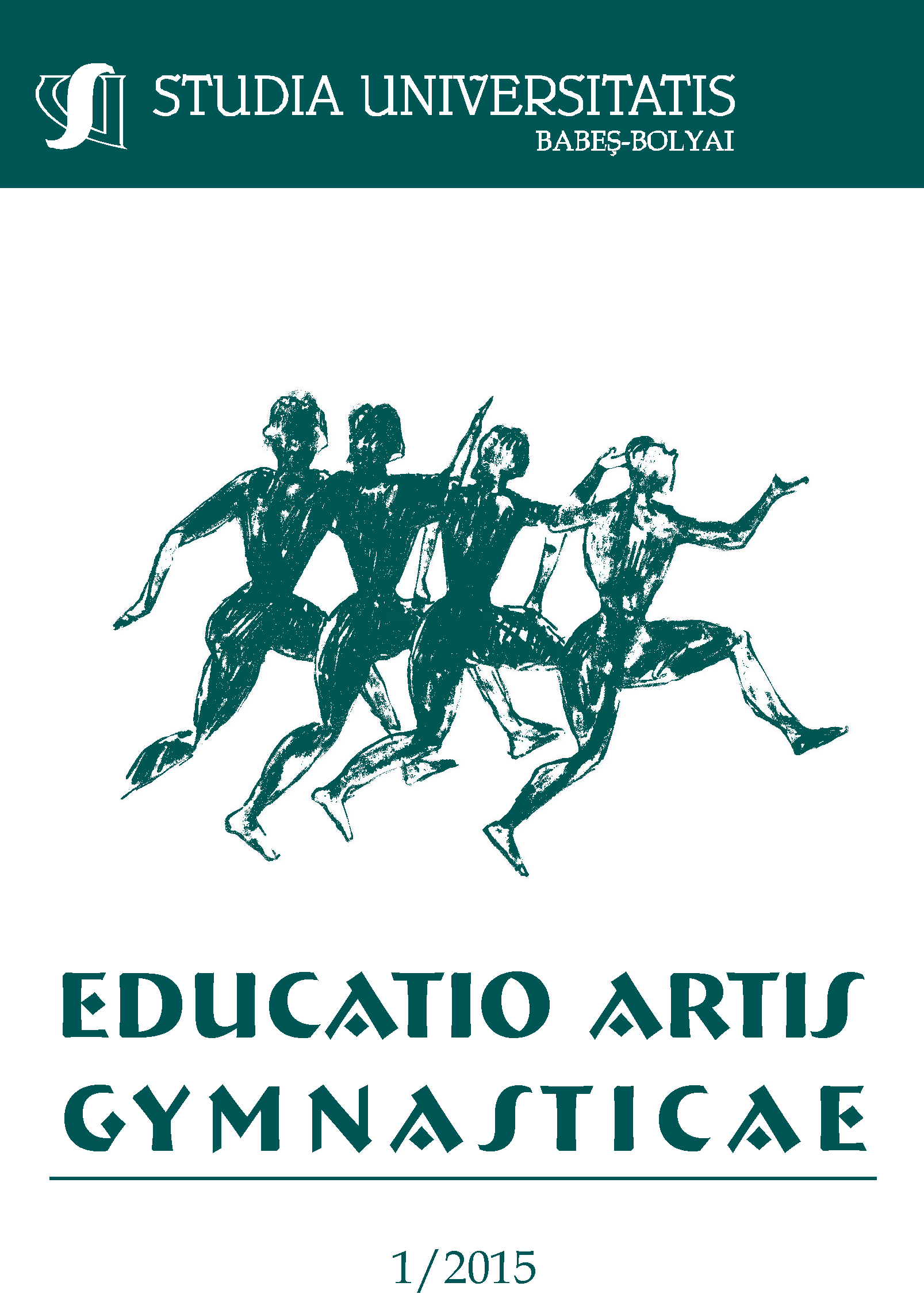THE IMPORTANCE OF MAINTAINING OPTIMAL HEALTH THROUGH PHYSICAL EXERCISE IN ASSESSING STUDENTS UBB CLUJ-NAPOCA
Keywords:
physical and mental health, physical activities, weight control, body image, leisure.Abstract
Physical health of man means a good health of the body, obtained through regular physical activity (exercise), good nutrition, and adequate rest. Optimal health many advantages a person's life. The way in which he understood to acquire and maintain health has great significance both for him and for society. Health is deeply connected lifestyle. Achieving perfect health, with all the effort, will remain a target difficult if not impossible, because human life is subject to permanent change. In the present study we aimed to what extent Babes-Bolyai University (BBU) students appreciate the importance of the physical exercise in maintaining optimal health status. We applied a questionnaire on a number of 465 students from 13 faculties. Respondents were aged between 18 and 40 years, with the vast majority being students between 19-21 years. A percentage of 71.7% of the students appreciated the physical activities as very important, 20.2% important and we appreciate that only 8.1% unimportant. In assessing the importance of weight control 52.2% felt it was very important, 25.3% important, and for 22,5% unimportant. Assessment of body image reflects the vision of respondents on a body in optimal standards that maintain through physical activities. In this context 48.8% of students say it is very important, 29.4% say it is important, and 21.8% do not appreciate bodily appearance. Recognizing the benefits of physical exercise is important, as well as efficient organization of leisure that include physical activities.
Importanța menținerii stării de sănătate optimă prin exerciții fizice în aprecierea studenților din UBB Cluj-Napoca. Sănătatea fizică a omului înseamnă o stare bună de sănătate a corpului, obținută datorită activității fizice regulate (exercițiu), unei bune nutriții, și odihnei adecvate. Sănătatea optimă aduce multe avantaje vieții unui om. Felul în care acesta înțelege să-și dobândească și să-și mențină sănătatea are mare însemnătate atât pentru el cât și pentru societate. Sănătatea este legată profund de stilul de viață. Obținerea unei sănătăți ideale, cu toată strădania, va rămâne o țintă dificil de atins dacă nu chiar imposibilă, pentru că viața umană este supusă schimbării permanente. În lucrarea de față am urmărit în ce măsură studenții UBB apreciază importanța exercițiilor fizice în menținerea unei stări de sănătate optime. Am aplicat un chestionar pe un număr de 465 de studenți din 13 facultăți. Repondenții au avut vârste cuprinse între 18 și 40 de ani, majoritari fiind studenții cu vârsta cuprinsă între 19 – 21 de ani. Un procent de 71,7% din studenți au apreciat exercițiile fizice ca fiind foarte importante, 20,2% le apreciază ca importante și numai 8,1 % neimportante. În aprecierea importanței controlului greutății corporale 52,2% l-au considerat foarte important, pentru 25,3% este important, iar pentru 22,5 neimportant. Aprecierea imaginii corporale reflectă viziunea repondenților asupra unui corp în standarde optime ce se menține prin exercițiu fizic. În acest context 48,8% dintre studenți susțin că aceasta este foarte importantă, 29,4% spun că este importantă, iar 21,8 nu apreciază aspectul corporal. Recunoașterea beneficiilor exercițiilor fizice este importantă, la fel și organizarea eficientă a timpului liber ce să cuprindă practicarea activităților fizice.
Cuvinte cheie: sănătate fizică și psihică, activitate fizică, controlul greutății, imagine corporală, timp liber.
References
Alber, J., Köhler, U. (2004). Health and care in an enlarged Europe, Luxembourg, Office for Official Publications of the European Commission. Electronic version. Available online la http://www.eurofound.europa.eu/pubdocs/2003/107/en/1/ef03107en.pdf.
Baumeister, R.F., Campbell, J.D., Krueger, J.I. & Vohs, K.D. (2003). Does high selfesteem cause better performance, interpersonal success, happiness, or healthier lifestyles? Psychological Science in the Public Interest, 4, 1-44.
Ómarsson, Birgir Páll (2013). Thesis. Submitted in a partial fulfillment of the requirements of the BSc Psychology degree, Reykjavík University.
Braconnier A. (2007). «Introduction», in L'adolescence aujourd'hui, ERES, p. 7-10. URL: www.cairn.info/l-adolescence-aujourd-hui--978274920509-page-7.htm
Carter N. (2012). Medicine, Sport and the Body. A Historical Perspective, Bloomsbury Chapter p.13–35. DOI 10.5040/9781849662062.ch-001
Heatherton, T.F. & Helb M.R. (1998). Body Image. Encyclopedia of Menthal Health, vol. 1, pp. 257-266, Academic Press.
Nordqvist C. (2013). Medical News Today. http://www.medicalnewstoday.com/articles/150999.php.
Pawłucki A. (2014). Physical Culture and Sport. Studies and Research. Volume 61, Issue 1, Pages 15–27, ISSN (Online) 1899-4849, ISSN (Print) 2081-2221, DOI: 10.2478/pcssr-2014-0002.
Pop C.E. (2010). Starea de sănătate a populației din românia în context european. O abordare din perspectiva calității vieții. Calitatea vieții, XXI, nr. 3–4, pp. 274–305.
Volkwein-Caplan K.A.E., Volkwein K.A.E. (1998). Fitness as Cultural Phenomenon. Waxmann Verlag.
Witmer, L., Bocarro, J.N. & Henderson, K. (2011). Adolescent Girls’ Perception of Health within a Leisure Context. Journal of Leisure Research; Vol. 43, No. 3, pp. 334-354.
Downloads
Published
How to Cite
Issue
Section
License
Copyright (c) 2015 Studia Universitatis Babeș-Bolyai Educatio Artis Gymnasticae

This work is licensed under a Creative Commons Attribution-NonCommercial-NoDerivatives 4.0 International License.






